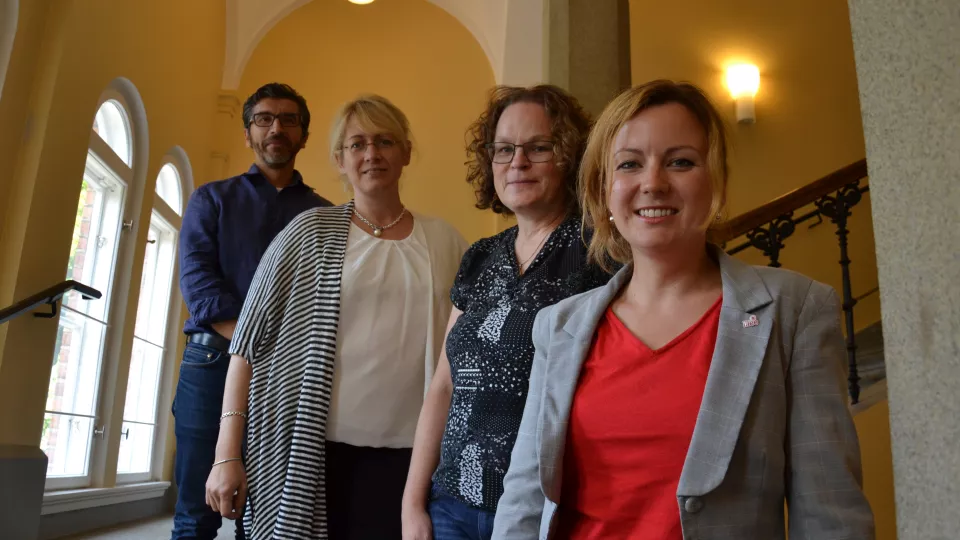The International Institute for Industrial Environmental Economics (IIIEE) was established in 1994 as an international centre at Lund University to address complex environmental challenges. Over the years, the IIIEE has developed into a unique interdisciplinary centre of excellence synthesizing insights form various disciplines to advance knowledge on how to catalyse transitions to low-carbon and resource efficient economies. The focus is on assessing governance and management processes and providing support for decision makers in public authorities and businesses.
Since its foundation, the IIIEE education and research has been truly interdisciplinary, collaborative and international. The IIIEE has pioneered a range of activities including interdisciplinary research, high quality international Master’s programmes and award-winning on-line courses including MOOCs. Researchers are invited as scientific experts by a number of international organisations, such as the IPCC, the IEA, the EU Commission and UN organisations. The time has now come to expand and further develop the interdisciplinary profile and platform for collaboration at the IIIEE – this by the establishment of four new professorships. The four professors at the IIIEE are:
Luis Mundaca – Professor in policy analysis for a transition to low-carbon and resource efficient economies
Luis Mundaca is an environmental economist who is interested in climate change, clean energy technologies, resource efficiency, behavioural change and development. He currently leads a research programme on behavioural economics in sustainable energy systems and rapid decarbonisation. His teaching activities concentrate on environmental economics for development policy, and energy and climate policy. With a strong applied and policy-oriented focus, Luis has also advised numerous companies, international agencies and government ministries across the Americas, Asia and in Europe. He has also served as Lead Author for the Global Energy Assessment and for the Fifth Assessment Report of the Intergovernmental Panel on Climate Change (IPCC). Recently, he was selected as a Lead Author for the upcoming IPCC Special Report on Global Warming of 1.5°C.
Jenny Palm – Professor in sustainable urban governance for a transition to low-carbon and resource efficient economies
Jenny Palm has a background in energy systems and urban related research where she conducts interdisciplinary research combining sociotechnical systems theory with analysis of planning process, governance, technology diffusion and end-users. Objects of study are urban infrastructure such as district heating systems, low-energy buildings and passive houses, building refurbishment and sustainable everyday life. Making these elements more sustainable is put in a broader socio-cultural, planning and governance context. The majority of Jenny’s project has been in collaboration with one or several actors outside academia. Her teaching activities concentrate on energy systems and interdisciplinary in PhD education. She is active in several national assessment panels for the Swedish Energy Agency and international she is in the expert panel for Norway’s Research council’s ENERGIX programme and Forskel in Denmark.
Nancy Bocken – Professor in sustainable business management and practice for a transition to low-carbon and resource efficient economies
Nancy’s main areas of interests around sustainability are business models, business experimentation, innovation for sustainability, scaling up sustainable businesses and closing the ’idea-action’ gap in sustainability. She has led several international collaborative research projects on sustainable business models. Nancy has been supervising and teaching at the University of Cambridge Institute for Sustainability Leadership, the Cambridge Department of Engineering and Judge Business School. In 2013 she was a Visiting Fellow at Yale University, where she was lecturing on the Corporate Environmental Strategy course, while continuing her work on sustainable business models. Interwoven with her academic work, Nancy regularly advises a range of organisations across sectors and continents and various sustainability start-up initiatives. She co-founded HOMIE, who develop and test circular business models, starting with pay per use home appliances.
Oksana Mont – Professor in sustainable consumption governance for a transition to low-carbon and resource efficient economies
Oksana Mont has background in sustainable consumption and production, in which she combines projects on innovative business models (for circular and sharing economy) with sustainable lifestyles (collaborative consumption and production). She has lead several international projects on sustainable consumption policy and governance (including tools for changing behaviour, e.g. nudging). She is supervising doctoral students and leads several research programmes on circular and sharing economies. Oksana is involved in high-level policy consulting and serves as an expert and evaluator of many international research- and practitioner-oriented programmes on different aspects of sustainability.


